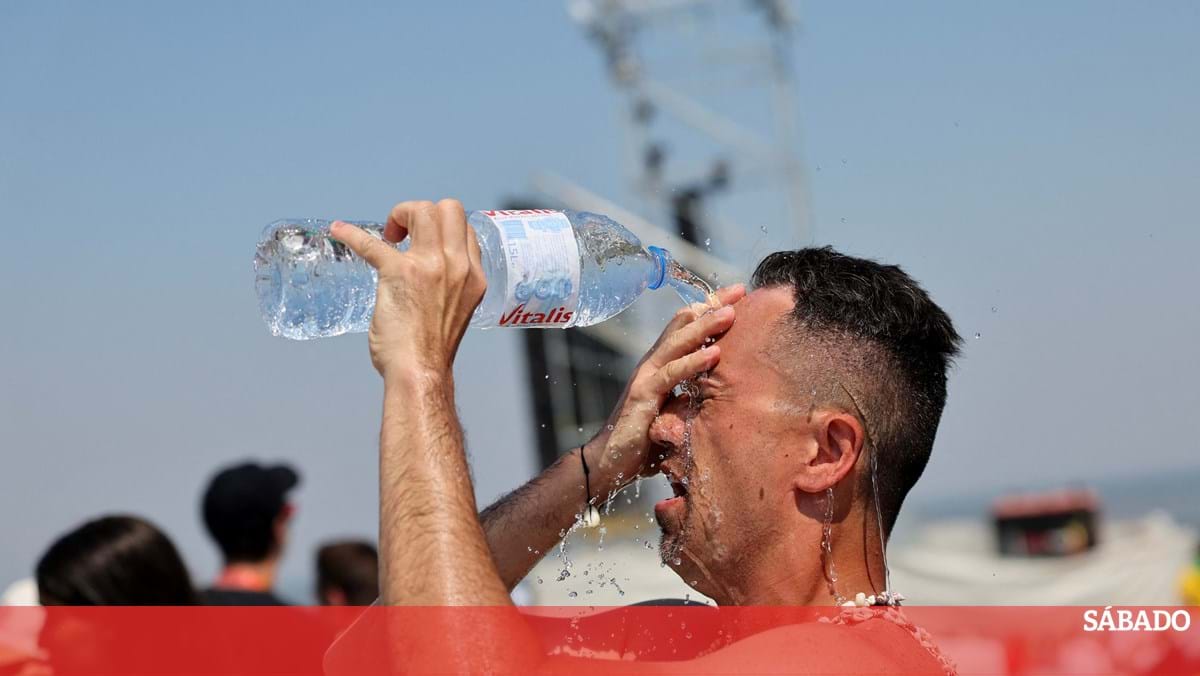“Children under six months of age should not be exposed to the sun, directly or indirectly,” the DGS confirms.
The Directorate General of Health recommends adopting additional preventive measures, such as drinking water, in light of the expected rise in temperatures over the next few days, which could reach 40 degrees in some locations.
Photograph: Violetta Santos Mora/Reuters
On days when temperatures rise, the Directorate General of Health (DGS) recommends increasing water intake, at least 1.5 liters per day, or natural fruit juices without sugar, and avoiding alcoholic beverages and activities that require great physical effort, which are sports and recreational activities in the air divorce.
The Directorate General of Food also advises giving “special attention” to groups most vulnerable to heat, such as children, the elderly, people with chronic diseases, pregnant women, people with limited mobility, workers in outdoor activities, physical activity practitioners, and isolated people.
Ensure that children drink water or natural fruit juices frequently and that they stay in a cool, well-ventilated environment. The same indicator is given to the elderly and people living in isolation.
“Children under six months of age should not be exposed to the sun, directly or indirectly,” the DGS confirms.
Choosing cooler hours to travel by car and not staying inside parked vehicles exposed to the sun are other tips that DGS leaves in its car. internet page.
On hot days, it is advised to seek cool, well-ventilated or air-conditioned environments for at least 2 to 3 hours per day and avoid direct sun exposure, especially between the hours of 11am and 5pm.
“Sunscreen with a factor equal to or greater than 30 should be used and its application should be renewed every two hours and after a shower at the beach or pool,” the DGS reports.
The health authority also recommends the use of loose, opaque clothing that covers most of the body, a wide-brimmed hat and sunglasses with UV protection.
Chronic patients or those on specific medications or diets should follow the recommendations of the attending physician or the SNS 24 call center, through the number 808 24 24 24.
To protect yourself from the negative effects of extreme heat, stay informed, hydrated, and cool.
The Portuguese Institute of the Sea and Atmosphere expects a rise in temperatures in the coming days, warning that maximum temperatures may reach values close to 40 degrees.
According to a DGS note, in some areas of the country, the temperature can, “sometimes, reach 44 degrees.”
“Nights will see high minimum temperatures, with values of more than 20 degrees in most parts of the territory, and may reach 25 degrees in some places in the Algarve, Alentejo and inland Beira,” the note says.
Find it out to
Editions today
Related articles
A new heat wave is coming. Learn what to do to protect your health
DGS advice for dealing with the heat of the next few days
How do you beat the high temperatures at the weekend?

“Wannabe internet buff. Future teen idol. Hardcore zombie guru. Gamer. Avid creator. Entrepreneur. Bacon ninja.”

